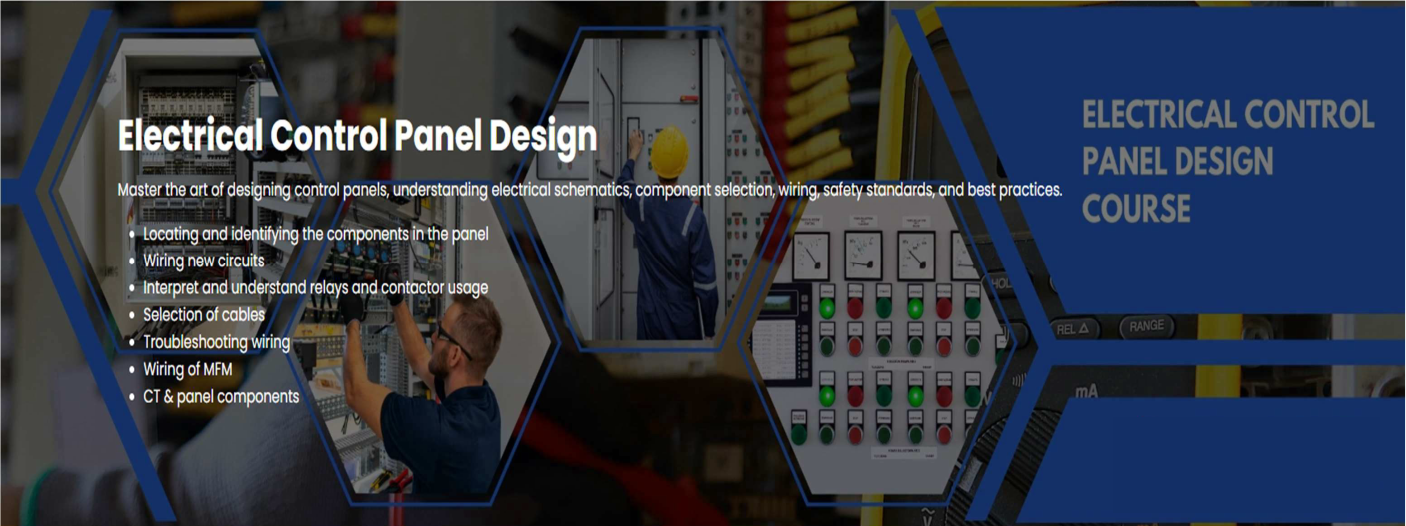
Control Panel Design & Automation Systems

Subodh Sawant
Design Manager-Electrical Engineering (HOD)
$ 2857
Beginner course for learners

Control Panel Design & Automation Systems
Trainers feedback
0
(0 reviews)
Subodh Sawant
Design Manager-Electrical Engineering (HOD)
Course type
Instructor led live training
Course duration
0 Hrs
Course start date & time
Coming in Next Month
Language
English , Hindi , Marathi
This course format is where trainer will explain you the subject via online live session. Date and time are not decided yet but it will be planned within next 2 weeks after you enroll & pay for this course?. Get in touch with our team if any clarification is required.
Why enroll
Why You Should Join the Control Panel Design Course:
Comprehensive Understanding of Control Panel Design:
Learn to design, implement, and maintain electrical control panels used in various industries, such as manufacturing, automation, and energy.
Hands-On Learning Experience:
The course offers practical exposure, ensuring you gain valuable skills in real-world control panel design and implementation.
Industry-Relevant Skills:
Master the key components of control panels, including circuit breakers, PLCs, HMIs, relays, and wiring—essential in modern automation systems.
Learn Industry Standards and Safety Protocols:
Understand design principles that comply with international standards and safety regulations, ensuring safe, functional, and reliable systems.
Use of Cutting-Edge Design Tools:
Gain experience with industry-standard design software like AutoCAD and EPLAN, which are vital in the control panel design process.
Troubleshooting and Maintenance Skills:
Develop the ability to diagnose and fix issues in control panels, equipping you with troubleshooting and maintenance expertise.
Enhance Your Career in Industrial Automation:
The course is ideal for professionals looking to advance in industrial automation, electrical engineering, or manufacturing, providing you with in-demand skills for today's job market.
Prepare for Real-World Challenges:
Learn how to handle the design challenges and complexities that professionals face in the field, and how to design systems that are efficient, scalable, and reliable.
Certification for Professional Growth:
Receive a Certificate in Control Panel Design, demonstrating your expertise and making you a valuable asset to employers in various industries.
Expand Your Career Opportunities:
Whether you're starting a new career, shifting to a different role, or upgrading your skill set, this course offers the foundation needed to succeed in control panel design and automation.
This course is perfect for anyone looking to strengthen their technical expertise and pursue a career in electrical and automation systems.
Opportunities that awaits you!

Earn a course completion certificate
Add this credential to your LinkedIn profile, resume, or CV. Share it on social media and in your performance review
Course details
Course Overview:
This course is designed to provide students with the knowledge and skills required to design, implement, and maintain electrical control panels used in various automation systems. The course will cover all aspects of control panel design from the fundamentals of electrical systems to the practical application of designing control panels that comply with industry standards.
Course Learning Objectives:
By the end of this course, students will be able to:
Understand the key components of control panels and their applications in automation.
Design electrical control panels that comply with international standards.
Understand the design process, including layout, schematics, and wiring diagrams.
Implement proper safety measures and guidelines in control panel design.
Use software tools for control panel design and documentation.
Troubleshoot and maintain control panels.
Course Outline:
Day 1: Introduction to Control Panel Design
Overview of Control Panels
Definition and Purpose of Control Panels
Applications of Control Panels in Industries (Manufacturing, Energy, Automation)
Key Components of a Control Panel
Different Types of Control Panels (Motor Control Centers, Distribution Panels, etc.)
Day 2: Understanding Electrical Systems
Basic Electrical Principles
Voltage, Current, Power, and Resistance
AC vs DC, Single-phase vs Three-phase Systems
Electrical Symbols and Diagrams
Power Distribution Systems
Day 3: Electrical Components
Key Components of Control Panels
Circuit Breakers, Fuses, and Disconnects
Contactors, Relays, and Timers
Programmable Logic Controllers (PLCs) and Their Role
Human Machine Interface (HMI) Systems
Sensors and Actuators
Day 4: Wiring and Terminals
Wiring Techniques and Components
Types of Wires and Cables
Proper Sizing of Wires and Cable Types
Terminal Blocks and Wiring Diagrams
Wire Identification and Labeling
Day 5: Design Principles and Standards
Control Panel Design Standards
IEC and NEC Standards for Control Panel Design
Design Layout Considerations (Space, Accessibility, Cooling)
Electrical Design: Choosing Components Based on Load Requirements
Power Distribution and Backup Systems (UPS, Generators)
Day 6: Drawing Schematics and Diagrams
Designing Electrical Schematics and Diagrams
Electrical Schematics and Panel Layouts
PLC Wiring and I/O Diagrams
Designing Protection and Control Circuits
Day 7: Control Panel Construction
Building Control Panels
Materials for Enclosures (Metal, Plastic, IP Ratings)
Designing to Meet Safety and Regulatory Standards
Component Mounting and Layout Planning
Cooling and Ventilation Considerations
Day 8: Wiring and Commissioning
Panel Wiring and Installation
Wiring Techniques and Best Practices
Wiring Diagrams for Panel Construction
Control Panel Testing and Troubleshooting
Commissioning Process for Control Panels
Day 9: Control Panel Design Software
Using Electrical CAD Software
Introduction to AutoCAD, EPLAN, and Other CAD Software
Creating Control Schematics and Layouts in CAD
PLC Programming Software and Integration
HMI Programming and Integration
Day 10: Automation and Integration
PLC and SCADA Systems
Designing Panels for PLC and SCADA Integration
Communication Protocols (Modbus, Profibus, Ethernet/IP)
Integrating Control Panels with Industrial Automation Systems
Day 11: Safety Standards and Protocols
Electrical Safety in Control Panel Design
Overview of Electrical Safety Regulations (NEC, OSHA)
Grounding, Isolation, and Protection
Lockout/Tagout (LOTO) Procedures
Personal Protective Equipment (PPE) Requirements
Day 12: Troubleshooting and Maintenance
Troubleshooting and Maintenance of Control Panels
Diagnosing and Repairing Faults
Preventative Maintenance Strategies
Common Control Panel Failures (Case Studies)
Final Review and Exam
Assessment and Evaluation:
Midterm Exam: (25%) - Covers Days 1 to 6
Final Exam: (30%) - Comprehensive Exam covering all course content
Project: (35%) - Design and build a control panel for a given application
Assignments & Quizzes: (10%) - Daily assignments on specific topics (design, safety, standards)
Course suitable for
Oil & Gas Automotive Electronics & Instrumentation Electrical Electronics & Telecommunication Health, Safety & Environmental
Key topics covered
Course Outline: Key Topics
Day 1: Introduction to Control Panel Design
Definition and Purpose of Control Panels
Applications in Industries
Key Components
Types of Control Panels
Day 2: Understanding Electrical Systems
Basic Electrical Principles
Voltage, Current, Power, and Resistance
AC vs DC, Single-phase vs Three-phase
Electrical Symbols and Diagrams
Power Distribution Systems
Day 3: Electrical Components
Circuit Breakers, Fuses, Disconnects
Contactors, Relays, Timers
PLCs and HMI Systems
Sensors and Actuators
Day 4: Wiring and Terminals
Types of Wires and Cables
Sizing Wires and Cable Types
Terminal Blocks and Wiring Diagrams
Wire Identification and Labeling
Day 5: Design Principles and Standards
IEC and NEC Standards
Design Layout Considerations
Choosing Components for Load Requirements
Power Distribution and Backup Systems
Day 6: Drawing Schematics and Diagrams
Designing Electrical Schematics
Panel Layouts
PLC Wiring and I/O Diagrams
Protection and Control Circuits
Day 7: Control Panel Construction
Materials for Enclosures
Regulatory Standards
Component Mounting and Layout Planning
Cooling and Ventilation
Day 8: Wiring and Commissioning
Wiring Techniques and Best Practices
Panel Construction Wiring Diagrams
Testing and Troubleshooting
Commissioning Process
Day 9: Control Panel Design Software
AutoCAD, EPLAN, and Other CAD Software
Control Schematics and Layouts
PLC and HMI Software Integration
Day 10: Automation and Integration
PLC and SCADA Systems
Communication Protocols (Modbus, Profibus, Ethernet/IP)
Integration with Industrial Automation Systems
Day 11: Safety Standards and Protocols
Electrical Safety Regulations
Grounding, Isolation, and Protection
Lockout/Tagout (LOTO) Procedures
PPE Requirements
Day 12: Troubleshooting and Maintenance
Diagnosing and Repairing Faults
Preventative Maintenance Strategies
Common Control Panel Failures
Final Review and Exam
Training details
This is a live course that has a scheduled start date.
Live session
Why people choose EveryEng
Industry-aligned courses, expert training, hands-on learning, recognized certifications, and job opportunities—all in a flexible and supportive environment.
- Industry Veteran
- Trainer Review
$ 2857
- $ 0 Early bird discount
Coming in Next Month
Questions and Answers
A: Control panels are centralized units that house electrical components such as switches, relays, circuit breakers, and programmable logic controllers (PLCs) used to control machinery and processes. In automation systems, they serve as the interface between the human operators and the machinery, enabling the monitoring, control, and automation of industrial processes. For more detailed information, you can refer to the NEMA Standards for Control Panels (https://www.nema.org/standards).
A: Designing an effective control panel involves several steps: 1) Defining system requirements and functions, 2) Selection of components considering electrical ratings and compatibility, 3) Layout design to ensure proper spacing, heat dissipation, and wiring paths, 4) Wiring and schematic diagram development, 5) Safety and compliance checks with standards such as UL, IEC, or NEMA, 6) Testing and validation before installation. Proper documentation is also essential for maintenance and troubleshooting.
A: Automation systems often rely on control panels as the physical hub where various hardware components such as sensors, actuators, and controllers are connected. The control panel houses PLCs or other control devices which execute programmed logic to automate machine operations. Signals from the field devices are routed through the control panel, processed, and used to control outputs. This integration allows centralized control, monitoring, and communication with higher-level systems such as SCADA or MES. More details can be found at Rockwell Automation's resource center (https://www.rockwellautomation.com).
A: Key standards and certifications include UL508A for industrial control panels in North America, IEC 61439 for low-voltage switchgear assemblies, and NEMA standards for enclosure ratings. Compliance ensures safety, reliability, and interoperability. Additionally, CE marking may be required for panels sold in Europe. Understanding these standards is critical for legal and functional requirements. You can refer to UL's website (https://www.ul.com) for certification details.
A: Common challenges include ensuring proper wire management to avoid clutter and interference, correct labeling for easy maintenance, adherence to electrical codes, avoiding electromagnetic interference (EMI), and managing heat dissipation. Mistakes in wiring can lead to faults and safety hazards. Using proper tools, wire ferrules, and color coding helps mitigate these issues. For best practices, see the guidelines from the International Electrotechnical Commission (IEC) at https://www.iec.ch.
More from Same Author
- Technical Courses
- Articles
4 (19)
Watch to learn anytime
28
E-Learning
Unlimited access
Instructor led live training
118
Online
Live courses
October 13
15 Hrs
5
Instructor led live training
893
195
Online
Live courses
September 15
1 Hrs
Earning and Growth option in same Industry Domain
- Pre-recorded
- Online live session
- Offline
- Articles
4 (41)
Watch to learn anytime
1354
10
E-Learning
Unlimited access
4 (41)
Watch to learn anytime
1072
5
E-Learning
Unlimited access
4
Watch to learn anytime
4754
31
E-Learning
Unlimited access
More Training & Development option to expand your reach
- Technical courses
- Soft-skill courses
- Seminars & Conferences
- Articles & Blogs
5
Instructor led live training
459
1
Online
Live courses
September 22
9 Hrs
Beginner
4 (23)
Instructor led live training
335
1
Online
Live courses
October 11
14 Hrs
Advanced
4 (23)
Instructor led live training
541
Online
Live courses
October 11
4 Hrs
Intermediate


























